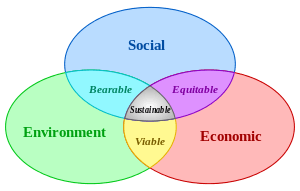Property rights (economics)
| Economics |
|---|
 |
|
|
| By application |
|
| Lists |
|
Property rights are theoretical constructs in economics for determining how a resource is used and owned. Resources can be owned (the subject of property) by individuals, associations or governments.[1] Property rights can be viewed as an attribute of an economic good. This attribute has four broad components[2] and is often referred to as a bundle of rights:[3]
- the right to use the good
- the right to earn income from the good
- the right to transfer the good to others
- the right to enforcement of property rights.
In economics, property usually refers to ownership (rights to the proceeds generated by the property) and control over a resource or good.
Property-rights regimes
Property rights to a good must be defined, their use must be monitored, and possession of rights must be enforced. The costs of defining, monitoring, and enforcing property rights are termed transaction costs.[4][5] Depending on the level of transaction costs, various forms of property rights institutions will develop. Each institutional form can be described by the distribution of rights.
The following list is ordered from no property rights defined to all property rights being held by individuals[6]
- State property (also known as public property) is property that is owned by all, but its access and use is controlled by the state. An example is a national park.[7]
- Common property or collective property is property that is owned by a group of individuals. Access, use, and exclusion are controlled by the joint owners. True commons can break down, but, unlike open-access property, common property owners have greater ability to manage conflicts through shared benefits and enforcement.[7]
- Private property is both excludable and rival. Private property access, use, exclusion and management are controlled by the private owner or a group of legal owners.
- Open-access property (res nullius) is not 'owned' by anyone. It is non-excludable (no one can exclude anyone else from using it) but may be rival (one person's use of it reduces the quantity available to other users). Open-access property is not managed by anyone, and access to it is not controlled. There is no constraint on anyone using open-access property (excluding people is either impossible or prohibitively costly). Examples of open-access property are the upper atmosphere (navigable airspace) or ocean fisheries (navigable waterways).
Open-access property may exist because ownership has never been established, granted, by laws within a particular country, or because no effective controls are in place, or feasible, i.e., the cost of exclusion outweighs the benefits. The government can sometimes effectively convert open access property into private, common or public property through the land grant process, by legislating to define public/private rights previously not granted.
Property rights and the environment
Implicit or explicit property rights can be created by regulating the environment, either through prescriptive command and control approaches (e.g. limits on input/output/discharge quantities, specified processes/equipment, audits) or by market-based instruments (e.g. taxes, transferable permits or quotas).[7]
It has been proposed by Ronald Coase that clearly defining and assigning property rights would resolve environmental problems by internalizing externalities and relying on incentives of private owners to conserve resources for the future. At common law nuisance and tort law allows adjacent property holders to seek compensation when individual actions diminish the air and water quality for adjacent landowners. Critics of this view argue that this assumes that it is possible to internalize all environmental benefits, that owners will have perfect information, that scale economies are manageable, transaction costs are bearable, and that legal frameworks operate efficiently.[7]
Property rights literature
In 2013 researchers [8] produced an annotated bibliography on property right literature concerned with two principal outcomes: a) reduction in investors risk and increase in incentives to invest, b) improvements in household welfare; and explored the channels through which property rights affect growth and household welfare in developing countries. They found that better protection of property rights can affect several development outcomes, including better management of natural resources.
See also
- Alienation (property law)
- Common ownership
- Commons
- Economic system
- Intellectual property
- Land tenure
- Law and economics
- Means of production
- Natural and legal rights
- Open-access
- Personal property
- Public property
- Private property
- Property income
- Right to property
- Social ownership
- State ownership
- Taxation as theft
References
- ↑ Alchian, Armen A. (2008). "Property Rights". In David R. Henderson. Concise Encyclopedia of Economics (2nd ed.). Indianapolis: Library of Economics and Liberty. ISBN 978-0865976658. OCLC 237794267.
- ↑ • "Economics Glossary". Retrieved 2007-01-28.
• Thrainn Eggertsson (1990). Economic behavior and institutions. Cambridge, UK: Cambridge University Press. ISBN 0-521-34891-9.
• Dean Lueck (2008). "property law, economics and," The New Palgrave Dictionary of Economics, 2nd Editio. Abstract. - ↑ Klein, Daniel B. and John Robinson. "Property: A Bundle of Rights? Prologue to the Symposium." Econ Journal Watch 8(3): 193–204, September 2011.
- ↑ Barzel, Yoram (April 1982). "Measurement Costs and the Organization of Markets". Journal of Law and Economics 25 (1): 27–48. doi:10.1086/467005. ISSN 0022-2186. JSTOR 725223.
- ↑ Douglas Allen, (1991). What are Transaction Costs? (Research in Law and Economics). Jai Pr. ISBN 0-7623-1115-0.
- ↑ Daniel W. Bromley, (1991). Environment and Economy: Property Rights and Public Policy. Cambridge, MA: Blackwell Pub. ISBN 1-55786-087-4.
- ↑ 7.0 7.1 7.2 7.3 7.4 Guerin, K. (2003). Property Rights and Environmental Policy: A New Zealand Perspective. Wellington, New Zealand: NZ Treasury
- ↑ Mike Denison and Robyn Klingler-Vidra, October 2012, Annotated Bibliography for Rapid Review on Property Rights, Economics and Private Sector Professional Evidence and Applied Knowledge Services (EPS PEAKS)https://partnerplatform.org/?tcafmd80
| ||||||||||||||||||||||||||||||||||||
| |||||||||||||||||||||
